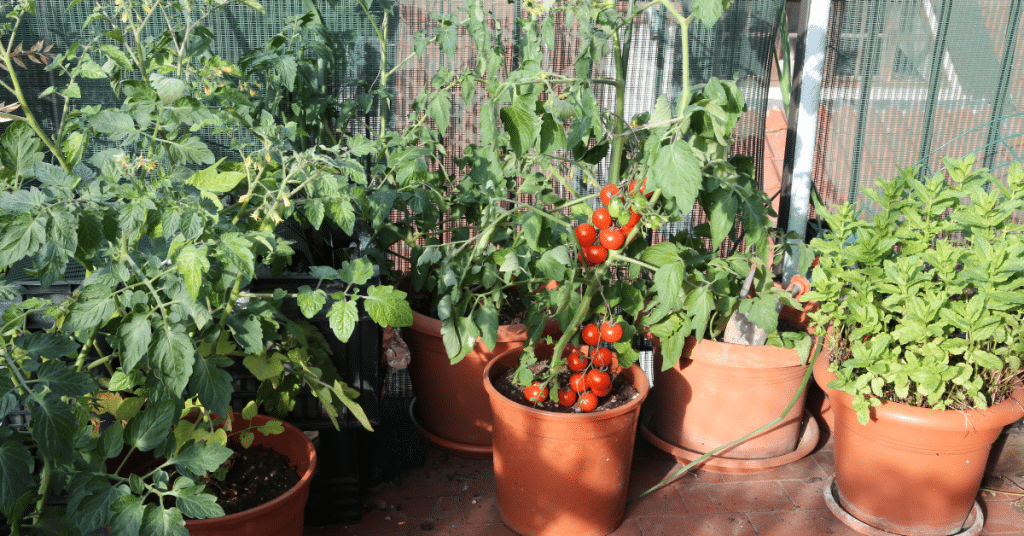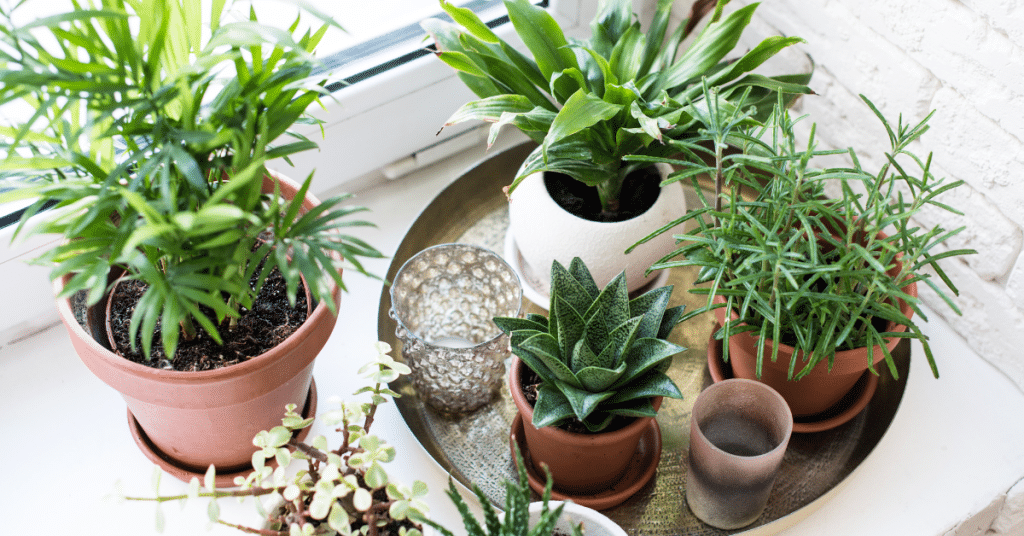
Apartment Gardening and It's Many Benefits
Have you ever looked out your apartment window, wishing for a bit of green in your concrete jungle? Do you long to develop something lovely and lively but feel constrained by your city life? Welcome to apartment gardening, where concrete meets chlorophyll and creativity blooms despite restricted space!
In the heart of bustling cities, amidst the concrete, steel, and glass, lies a thriving movement transforming apartment living one plant at a time. Apartment gardening is not just for the green-thumbed experts; it's for anyone and everyone who wishes to bring a piece of nature into their living space.
So, please grab a cup of tea, find a cozy spot by your window, and embark on a journey that takes you from dreaming about a garden to growing one right in your apartment. Prepare to turn your living space into an oasis!
Why Apartment Gardening?
Apartment gardening is a blossoming trend that enables urban dwellers to connect with nature in their living spaces. It offers numerous benefits and a sense of home in urban environments.
Benefits of Apartment Gardening
This practice involves growing plants and vegetables in small spaces like balcony garden, terraces, or window boxes. Here are ten benefits of apartment gardening:
1. Space Optimization:
Indoor apartment gardens allow individuals living in small spaces to optimize their available areas effectively. Using containers and vertical gardening techniques, you can grow various flowering plants and edible plants without needing a large backyard.
2. Health Benefits of Apartment Gardening:
Apartment gardening has been proven to reduce stress, anxiety, and depression. It provides a sense of purpose and promotes mental well-being. Having access to fresh and organic produce keeps your body healthy.
3. Access to Fresh Produce:
Growing your fruits, vegetables, and fresh herbs means accessing fresh, organic produce right at your doorstep through container gardening. This ensures you know exactly where your food comes from and reduces your reliance on store-bought produce.
4. Environmental Impact of Apartment Gardening:
Apartment gardening contributes to environmental sustainability. Plants absorb carbon dioxide and release oxygen, helping to improve air quality. Additionally, growing your own food reduces the need for transportation and packaging, leading to lower carbon emissions.
5. Connection with Nature:
Even in the heart of a bustling city, gardening allows you to connect with nature. Watching your lush outdoor or indoor plants grow and flourish brings joy and satisfaction.
6. Creativity and Aesthetics:
Apartment gardening allows you to express creativity through various plant arrangements and garden designs. Indoor and outdoor plants add aesthetic appeal to your living space, making it more enjoyable and visually pleasing. Grow plants that can add beauty to your indoor garden are snake plants and flowering plants.
7. Educational Value of Apartment Gardening:
Gardening offers an opportunity to learn about plant life cycles, horticulture, and sustainable practices. It can be a valuable educational experience for adults and children alike.
8. Cost-Effective:
Growing your own vegetables and herbs can save money in the long run, as store-bought organic produce can be expensive. Container gardening requires minimal investment and can yield a significant return. Additionally, you can have your salad greens anytime you want.
9. Community Building:
In urban areas, apartment and container garden can foster a sense of community among neighbors who share a common interest in gardening. Participating in gardening clubs or community gardens can strengthen social bonds.
10. Adaptability:
Apartment gardening allows you to adapt to changing seasons and weather conditions. You can move containers indoors during colder months or adjust your garden layout based on sunlight exposure.
Overall, apartment gardening offers many benefits, from practical advantages like access to fresh produce and cost savings to emotional well-being and environmental impact. It's a rewarding hobby that brings nature into urban living spaces, enriching the lives of those participating.
Challenges of Apartment Gardening
While apartment gardening has numerous benefits, it also has its fair share of challenges. These challenges are mainly due to limited space, environmental constraints, and unique urban living conditions. Here are some common challenges of starting your own garden:

- Limited space: The most significant challenge is the small space available for gardening. Apartments often have small balconies or window sills, restricting the number and size of plants that can be grown. Additionally, growing plants like fruit trees and citrus trees can be limited.
- Direct Sun for Exposure: Many apartments may need full sun throughout the day, especially in high-rise buildings or shaded areas. Insufficient sunlight can hinder plant growth and limit the variety of other plants that can be cultivated. Plants should be exposed to full sun for at least six to eight hours.
- Temperature Fluctuations: Urban environments can experience temperature fluctuations, particularly in concrete jungles with heat-absorbing buildings. Extreme hot and cold temperatures can stress plants and affect their health.
- Pests and Diseases: Apartment gardens may be more susceptible to pests and diseases due to the close proximity of neighboring plants and the potential lack of natural predators. Controlling pests without harming the surrounding environment can be challenging.
- Watering and Drainage: Proper watering and drainage are crucial for successful apartment gardening. Overwatering or poor drainage can lead to root rot and other water-related issues, while underwatering can stunt plant growth.
- Soil Quality: The soil quality in urban areas may need to be improved for gardening. Many apartments need access to natural soil, and using low-quality soil or contaminated soil can negatively impact plant health.
- Weight Limitations: Balconies and terraces often have weight restrictions, which limit the number and size of containers and planters that can be used. This can be a significant concern for those wanting to create a lush garden in a small apartment.
- Container Selection: Choosing the right containers for gardening is crucial. Small, plastic containers can restrict root growth and limit plant development. Additionally, finding space for the containers when not in use can be challenging.
- Time and Maintenance: Apartment gardening requires regular care and attention. Balancing gardening activities with busy urban lifestyles can take time, leading to neglected plants and reduced yields.
- Regulations and Policies: Some apartments may have strict rules or policies related to gardening, limiting the types of plants you can grow or the appearance of your garden.
Despite these challenges, many apartment gardeners find innovative solutions to make the most of their limited space and overcome environmental constraints.
Getting Started with Apartment Gardening
Getting started with your balcony gardens can be a rewarding and enjoyable experience, even with limited space. Here are some steps to help you begin your apartment gardening journey:
Assess Your Space:
Look at your apartment and identify areas that receive adequate sunlight. Balconies, windowsills, and even indoor spaces with good natural light are potential spots for gardening. Consider the apartment garden location, weight limitations, and any regulations related to gardening in your apartment complex.
Select Suitable Plants:
Choosing plants varieties for apartment gardening and your specific conditions is vital. Look for compact varieties of herbs, vegetables, and flowers that can thrive in containers. Some popular options include cherry tomatoes, lettuce, basil, mint, and marigolds.
Choose Containers:
Select containers with good drainage appropriate for the plants you wish to grow. Plastic, ceramic, or wooden pots are common choices. Hanging baskets for shallow rooted plants, wall-mounted planters, and vertical gardening systems can maximize your space. Also, choosing self watering containers is advisable to conserve water.
Prepare the Soil:
Use a high-quality potting mix and an organic soil enhancer if you use soil from the garden, as it may not be well-draining and can introduce pests and diseases if not amended. Add some organic compost to enrich your potting soil with nutrients.
Planting:
Follow the planting directions for each plant and sow the seeds or transplant seedlings into the containers. Give each plant enough space to grow, and consider the height of mature plants when arranging them.
Watering:
Develop a watering schedule based on the needs of your plants and the environmental conditions. Be careful not to overwater, as containers can retain excess moisture, leading to root rot. Use a watering can for efficient watering, especially your potted plants.
Light Management:
Monitor the amount of sunlight your plants receive daily. Rotate the containers if needed to ensure even light distribution. If your apartment or indoor garden lacks sufficient natural light, consider using grow lights to supplement it. You can also choose to grow shade loving plants for indoor gardening.
Fertilization:
Use a balanced natural liquid fertilizer or organic fertilizer to provide essential nutrients to your plants. Follow the recommended dosage to avoid over-fertilization, as it can damage the plants.
Pest and Disease Control:
Regularly inspect your plants for signs of pests or diseases. If you notice any issues, use organic or natural pest control methods.
Learn and Experiment:
Stay curious and learn about gardening techniques, plant care, and horticulture. Experiment with different plant varieties and arrangements to find what works best for your space.
Tools and Supplies Needed for Apartment Gardening
Apartment gardening requires some essential tools to help you care for your plants and maintain your garden efficiently. Here's a list of tools you may need:
Watering Can or Hose Attachment:
Small watering cans are ideal for gently and precisely watering your plants in containers. Alternatively, a hose attachment with a gentle spray nozzle can be useful if you can access an outdoor water source.
Hand Trowel:
A hand trowel is a small shovel-like tool used for planting, transplanting, and digging in containers. It helps you create holes and handle soil easily.
Pruning Shears:
Pruning or hand pruners are essential for trimming and shaping plants. They help remove dead or damaged leaves, flowers, and stems.
Gardening Gloves for Apartment Gardening:
Protect your hands from dirt, thorns, and potential allergens with gardening gloves with claws. These gloves fit well and provide enough dexterity. Whether digging, planting, raking, or poking, this helpful tool makes them fast, easy, and enjoyable! The Clawed Gardening Gloves ensure you are protected while you do some easy and even heavier tasks in the yard.
Garden Scissors:
Sharp garden scissors can be handy for precise pruning and deadheading flowers.
Plant Labels for Apartment Gardening:
Keep track of your plants using plant labels or markers. They help you remember the names of your plants, planting dates, and any specific care instructions.
Garden Tool Organizer:
An organizer or tool caddy can help keep your gardening tools in one place and easily accessible when needed.
Garden Apron or Pouch:
An apron or pouch with multiple pockets can carry small tools and accessories while working in your garden.
Misting Bottle for Apartment Gardening:
A misting bottle or sprayer is helpful for gently misting the leaves of your plants, especially in dry indoor environments.
Soil Moisture Meter and pH Testing Kit :
The handy tool helps you determine when your plants need watering by measuring the moisture level in the soil. If you want to monitor the pH level of your soil, a pH testing kit can be beneficial.
Plant Pot Mover of Apartment Gardening:
Make gardening effortless with our Plant Pot Mover! Easily transport heavy garden pots around your apartment without strain.
Small Rake or Fork:
A small rake or fork can loosen the soil surface, remove debris, or aerate the soil in containers.
Plant Support Stakes and Trellis:
If you're growing taller plants or vining varieties, consider using plant support stakes to help them stay upright.
Trays or Saucers:
Use trays or saucers under your containers to catch excess water and prevent it from staining your floors or balcony.
Black Metal Trellis for Apartment Gardening:
This 6.2ft tall Trellis Obelisk supports climbing plants like tomatoes, cucumber, beans, ivy, roses, and clematis. It allows plants to grow correctly. Not only does the Trellis Obelisk provide support for your climbing plants, but it also adds a stylish and elegant touch to your garden or patio.
These essential garden tools will equip you to take care of your apartment garden effectively. As your gardening skills and plant collection grow, you may find other specialized tools or accessories that suit your needs. Remember to invest in good-quality tools which will serve you well in the long run.
Conclusion
Apartment gardening offers many benefits, from space optimization and fresh produce to the thrill of fostering life in the concrete jungle. Our perseverance and green-thumb magic will make the hurdles fall like leaves under our gardening boots.
An apartment garden fosters a connection to nature outside the concrete. It's a lifelong learning experience where you'll see development, ecosystems, and life's resilience in your own home. Let your apartment garden inspire your friends and neighbors, show your devotion to sustainable living, and soothe your soul. It reminds us that we can enjoy nature even in the city without a wide outdoor space.
You can start the green revolution by turning residential windows, balconies, and terraces into ecosystems. Let us grow the best plants and paint our cities green, hopeful, and resilient.
Apartment gardening is magical—let's grow a brighter, greener future. Happy gardening!
